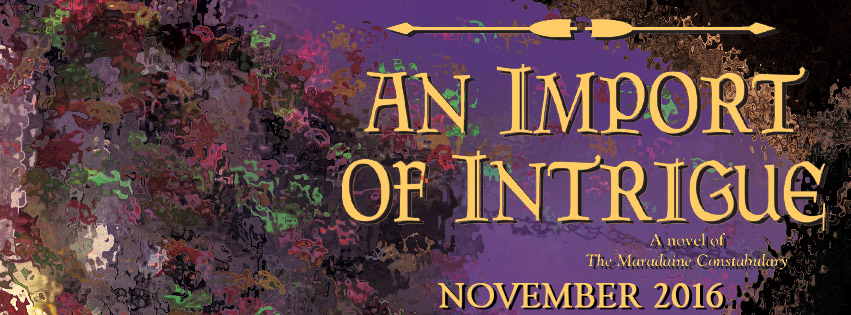If you go to workshops-- especially SF/F related workshops-- or otherwise seek out Writing Advice, sooner or later you're going to hear Heinlein's Five Rules for getting published.
The rules are pretty strong, solid advice, but to a degree they have more bearing on a short-story market than a novel market. So I'll go over the five rules over the next few posts, and how I've integrated them into my process.
RULE #1: YOU MUST WRITE
You really can't argue with this, right? If you want to be a successful writer, writing is a given.
But what does this mean, in terms of actual action? Here's how I see it:
A. You must know what you're writing.
B. You must know how you write.
C. You must work with discipline.
Now, for the first part, knowing what you're writing: apply this as broadly as you want, but I think you need to know what your general plans and intentions are. Of course, things can get away with you: you can start writing a short story and discover a novel. Or you can start a novel and find it's only a novella. But the point is you've got to have some sort of plan when you sit down.
This ties directly to the second part: know how you write. Which is very different from "know how you think you write". For example, I'm a big outliner. This is what works for me, and I learned that through a process of discovery. I did a whole lot of, "I'm going to write and see where it goes" and where it went was nowhere slowly. Another example: I'm not a writer who can do the "just get it written, and then fix it in editing" thing. That isn't to say I don't edit or make a lot of changes when I do, but I see a rough draft as a foundation, and if I'm not building a strong foundation, it doesn't work for me. Another point: I get the most creative in later hours, usually after 10pm. I've accepted all these points as how I work best, and I've thrived by accepting that. So the advice I have there is: learn how you write, but look very critically at if that's really what works best, or if it's how you think you ought to work best.
Finally: write with discipline. Once you know what you're doing and how you do it best, sit down and get on it. "Write every day" is good advice, but it doesn't necessarily apply to everyone (see point B). But this is what I've found effective for me: when I'm working on a project (in rough draft), I set a daily writing goal. This is a low-balled goal, a minimum quota. This is the, "Fine, you've earned the right to eat today" amount of writing. It's a C-. Now, many days I will write more than that quota-- and going over quota doesn't give me slack the next day. But by keeping that quota low, I keep myself from getting in a shame-spiral of failure. Because I know how I work, and if I "get behind" on even an arbitrarily set quota, part of my brain says, "We can't do it" and shuts down.
And before I learned properly how I write, I would do that to myself constantly. I would set an Unreasonable Writing Goal (I would even call it that to try and spur myself on), and then kick myself for not reaching it, and the whole thing would stall out.
RULE #2: YOU MUST FINISH WHAT YOU WRITE.
To which I say, yes. But a qualified yes.
Of course you have to finish what you're working on. An unfinished story-- especially an unfinished novel-- is nigh-useless unless you get hit with exceptional circumstances, which are not something you can count on.
But here's the ugly truth that is sometimes hard to face: not every project is worth finishing. Sometimes you're just going down a blind alley, and continuing to work on it is the equivalent of flailing around in the dark instead of finding a light.
So here's the qualification: You must finish what you write, unless you determine that finishing it is wasting your time.
HOWEVER, "wasting your time" is a LOT different from, "This is hard and I want to work on the shiny new thing I came up with". Like I said earlier write with discipline, and that means pushing through the hard work to the other side. And every one of the finished projects that I have shopping had that fallow period were the process of writing felt interminable.
There's a difference between smashing your way through the brick wall, and smashing your head against it. The really hard part is figuring out which one you're doing.
And most important, if you don't finish one thing that you write, you're not finishing that so you can finish something else. Because, yes, you must finish before you can move on to the next step.
RULE #3: YOU MUST REFRAIN FROM REWRITING, EXCEPT TO EDITORIAL ORDER
Now, this makes it sound like Heinlein is talking about not editing your work at all, which I don't see as the case. Editing your work falls under, in this case, the Second Rule: finish the work. A rough draft that you've typed "the end" on is nice, but it isn't finished.
But at some point, you have to decide it's done, and further fiddling isn't serving any purpose beyond feeding your own anxiety. So the advice is less, "You shouldn't edit your work" but, "If you keep picking at it, it'll never heal."
So you have to reach a point of acceptance with the work, where you stop seeking one more bit of beta-reading approval, where you think if you just re-do this one part it'll be right, and then the full scope of your genius will be clear. But are you really making it better, or are you just rearranging the furniture?
And, again, this is a point where you have to do some triage of your own work. Are you constantly fiddling because it really is salvageable, or because you don't want to admit that you've invested too much into it already to put it in the trunk?
That's the dark side of this advice: some works, you have to stop messing with and decide to send it out into the world. Others, you have to stop messing with and put it away forever. Either way, once you reach that point, you have to stop poking until someone gives you a really good reason to.
So, now you've written something, you've finished it, and you've stopped fiddling with it. This can only mean it's time for one thing:
RULE #4: YOU MUST PUT THE WORK ON THE MARKET.
This rule ties into the third rule a lot. Because when it comes down to it, you've got to push the baby bird out of the nest and see if it's going to fly.
Because everything you've done up until this point is darn well useless if you don't. They aren't going to beat a path to your door to see if you've concocted some brilliance that they might want to publish.
This includes the ever painful act of querying an agent, which may be the most dreaded act a writer has to face. But let me tell you, querying in and of itself is pretty easy. It may almost be too easy. It's so easy that many agents receive over 500 queries a week. However, a good portion of those queries are more or less the equivalent of shouting baboons hurling their feces at an agent. So you've got to work extra hard to make your query be the thing that can be noticed above the din of baboon screeches and feces. There are only two steps to accomplish that:
1. Follow the submission guidelines.
2. Write a brilliant query.
Step one is very, very easy if you just pay a modicum of attention. Do not get lazy or sloppy with it. Every time. Or you might send a query addressed to "Dear ".
Step two is harder, I won't deny it. Research query letters. Polish the hell out of it. This is the calling card for your novel, and you need to make it as strong as possible, clean and concise.
Concise is a big thing. I've had the opportunity to read many query letters, and many times I see-- especially with genre-- writers who want to explain EVERYTHING in the query. It really isn't necessary. You want to entice the agent to read the book, not summarize it.
Also: avoid negativity. Especially in regards to a. the genre you're querying and b. other writers in that genre. Apparently this sort of denigration ("Sci-fi is stupid, so I wrote a better sci-fi novel which will blow everyone away.") is common.
Heinlein gives his Fifth Rule as such:
RULE #5: YOU MUST KEEP THE WORK ON THE MARKET UNTIL IT IS SOLD.
So, here's where Mr. Heinlein and I must part ways, because I don't fully agree with this rule. For one, I think it's already intrinsic to the Fourth Rule-- you need to put stuff out there, and it needs to stay out there. Sure. So in part, I'm not too keen on this rule because it's redundant. But also, on some level, I think it's bad advice. You've got to be able to recognize when it's time to put something in the trunk. That you might be doing yourself more harm than good flailing a project out there that's well and truly flawed and unsellable.
The other big reason I'm not on board with this rule is it doesn't feel like the next proper step in terms of discipline. "Put it out there" is energy. "Keep it out there" is inertia.
So what's a better rule to show what one needs to do in order to move on to the next level? If I may be so bold:
ALTERNATE RULE #5: YOU MUST MOVE ON TO THE NEXT PROJECT.
This makes a lot more sense to me. You've pushed your baby out of the nest, and regardless of what happens with that, you've got to make something else. Something new.
And I must stress the 'something new'. I fully understand the temptation, but you shouldn't go headfirst into 'Book Two' of whatever you're shopping. Put down notes, draft an outline, have a plan? Sure. Yes. If my experience is typical, if you get interest in the book you're shopping, you'll be asked for plans for possible books two and three. So having those plans is good. But leave it at that.
Whatever you really work on next needs to be something whose sale is not dependent on the sale of the thing your shopping. Because then you're building a whole house of cards, investing more and more into something you might have to through in the trunk. And if you invest that much, you're going to become more and more petrified in letting go. Move on. To something new.
It's hard. It's supposed to be. Tom Hanks will tell you why.
Go get to it.


